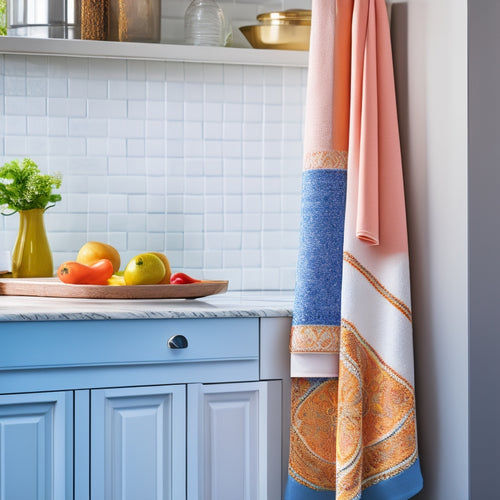
Kitchen Equipment Maintenance: A Vital Checklist
Share
Regular maintenance of kitchen equipment is important to preventing unforeseen failures, reducing downtime, and maintaining a safe and sanitary food preparation environment. A thorough checklist should include inspecting ovens, faucets, refrigeration units, dishwashers, microwaves, and coffee machines for performance, cleanliness, and potential issues. Cutlery and utensil maintenance involves proper storage, sharpening, and sanitizing to prevent rust and corrosion. Additionally, a safety and functionality review should be conducted to assess ventilation systems, electrical equipment, installation, and operation. By following this essential checklist, kitchen operators can ensure peak performance and uncover potential problems before they escalate.
Key Takeaways
• Regular kitchen equipment inspections prevent failures, reduce downtime, and maintain a safe environment.
• Clean and inspect refrigeration units, dishwashers, and microwaves regularly to prevent breakdowns and ensure efficiency.
• Maintain sharp cutlery and utensils through proper storage, regular sharpening, and sanitizing to impact food quality and presentation.
• Ensure kitchen equipment safety by inspecting ventilation systems, electrical equipment, and fire extinguishers, and verifying proper installation and operation.
• Develop a routine maintenance schedule to detect potential issues, reduce energy consumption, and prolong the lifespan of kitchen equipment.
Kitchen Equipment Inspection Essentials
Regular kitchen equipment inspections are crucial for the smooth operation of a commercial kitchen. They help prevent equipment failures, reduce downtime, and maintain a safe and sanitary environment. A thorough inspection should include an oven grill assessment to identify wear or damage affecting cooking performance.
Additionally, faucet inspections are important to detect leaks or limescale buildup that could cause water waste or contamination. It is also essential to check the cleanliness and condition of cooking equipment, inspect burners and components, and verify the accuracy of temperature gauges on cooking appliances.
Prioritizing these inspections can help kitchen operators minimize equipment downtime, lower maintenance costs, and ensure a safe and efficient working environment.
Refrigeration and Dishwasher Care
Check the accuracy of temperature gauges on refrigeration units and dishwashers to guarantee peak efficiency and prevent food spoilage. Accurate temperature control is essential for maintaining food quality and safety.
To ensure optimal performance, perform regular maintenance tasks:
-
Clean condenser coils on refrigeration units to sustain efficient cooling and prevent overheating.
-
Inspect dishwasher filters and clean or replace them as needed to prevent clogs and uphold cleanliness.
-
Perform refrigeration troubleshooting to identify and address potential issues, such as faulty compressors or leaky seals, before they lead to significant problems.
Microwave and Coffee Machine Check
During routine kitchen equipment maintenance, microwave ovens and coffee machines require thorough inspection to maintain peak performance, cleanliness, and safety.
Regular appliance upkeep is essential to prevent breakdowns, reduce energy consumption, and uphold a hygienic environment.
Begin by checking the condition and cleanliness of microwave ovens, paying attention to any food residue, splatters, or moisture buildup.
Next, inspect coffee machines for signs of wear, leaks, or clogged brewing components.
Perform machine sanitation by descaling and cleaning brewing units, as well as wiping down exterior surfaces.
This meticulous approach will guarantee these appliances continue to function efficiently, while also promoting a clean and safe kitchen environment.
Cutlery and Utensil Maintenance Tips
In addition to maintaining the proper functioning of kitchen appliances, preserving the quality and condition of cutlery and utensils is crucial for efficient food preparation and presentation. A well-preserved set of cutlery and utensils can greatly impact the overall quality of food prepared and served.
To sustain the quality of cutlery and utensils, follow these essential tips:
-
Proper Utensil Storage: Store utensils in a clean, dry place to prevent rust and corrosion. Assign a designated space for each utensil to guarantee easy access and organization.
-
Regular Cutlery Sharpening: Routinely sharpen cutlery to uphold its cutting performance and prevent accidents. A blunt knife is more likely to slip and cause injury than a sharp one.
-
Cleanliness and Sanitation: Clean and sanitize cutlery and utensils after each use to prevent the spread of bacteria and contamination.
Safety and Functionality Review
The comprehensive assessment of kitchen equipment safety and functionality is a critical component of maintaining a well-organized and hazard-free kitchen operation. This assessment involves inspecting ventilation systems to confirm they meet safety standards, as well as conducting functionality checks on electrical equipment to prevent electrical shocks or fires.
It is essential to verify that all equipment is installed, operated, and maintained according to the manufacturer's instructions and relevant industry standards. A thorough safety and functionality assessment also includes examining fire extinguishers, weighing scales, and other measuring devices to confirm they are properly calibrated and ready for use.
Frequently Asked Questions
How Often Should I Replace Water Filters in My Kitchen Equipment?
When it comes to crystal-clear water, don't cry over spilled milk - replace water filters regularly. Filter lifespan varies, but as a rule of thumb, swap them every 6-12 months or per manufacturer's guidelines to guarantee peak performance and maintenance frequency.
Can I Use Abrasive Cleaners on My Stainless Steel Appliances?
When cleaning stainless steel appliances, avoid using abrasive cleaners, as they can scratch the surface. Instead, opt for gentle, specialized kitchen appliance cleaners and soft cloths to maintain the metal's integrity and prevent damage.
Are There Any Specific Regulations for Kitchen Equipment Maintenance?
Adhering to regulations compliance and safety standards is essential in kitchen equipment maintenance. Familiarize yourself with local health codes, OSHA guidelines, and manufacturer recommendations to guarantee a safe and compliant kitchen operation.
How Do I Prevent Pest Infestations in My Kitchen Equipment?
To prevent pest infestations, implement a rigorous sanitation regimen, including regular equipment inspection and cleaning, ensuring removal of food residue, crumbs, and spills, thereby eliminating attractants and habitats for pests.
Can I Perform Kitchen Equipment Maintenance Tasks on My Own?
'Tackling kitchen equipment maintenance solo can be a challenging task, but with a DIY mindset, you can master equipment inspection and troubleshooting, ensuring safety and efficiency, while avoiding costly repairs, but only if you're willing to roll up your sleeves and get hands-on.'
Related Posts
-

Tips for Choosing Under-Cabinet Lighting Fixtures
When choosing under-cabinet lighting fixtures, consider your kitchen's layout and functionality. Assess countertop ma...
-

Over-The-Door Kitchen Towel Holder
An over-the-door kitchen towel holder is a smart way to maximize your space while keeping towels easy to grab. It hoo...
-

Creating More Space in a Tiny Kitchen
You can alter your tiny kitchen into a more spacious haven by utilizing smart storage solutions. Install wall-mounted...


